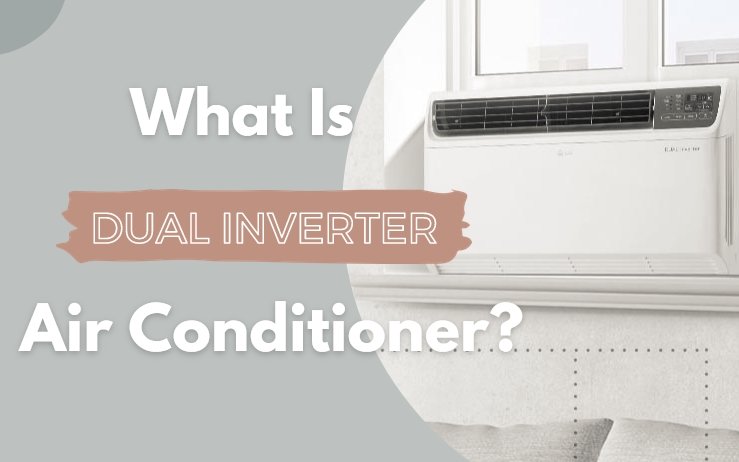You’ve likely heard about dual inverter ACs, but many still wonder, “What is a dual inverter air conditioner?” This confusion is understandable, as not everyone possesses the technical or mechanical background to grasp how inverter compressors, especially those in dual inverter ACs, function to enhance efficiency and control room temperature more effectively.
So, to ensure you have picked the suitable unit, you need to understand the basic differences between the two unit types.
What Is Dual Inverter Air Conditioner
So, what exactly is a dual inverter air conditioner? Technically, it’s an AC unit equipped with a dual inverter compressor featuring twin rotary compressors, each with two compression chambers. This design ensures superior rotational balance and compression torques, reducing vibration, diminished noise, and enhanced efficiency.
The dual inverter compressor is pivotal in managing power consumption, allowing the AC to operate at varying cooling capacities and efficiently reach the desired level of cooling without always running at full capacity.

In contrast, a regular inverter AC features just one rotor compressor, which, while more energy-efficient than non-inverter types, doesn’t match the performance of dual or triple inverter ACs. The cooling efficiency of a single inverter AC depends significantly on the compressor’s speed.
Unlike non-inverter models, it offers more precise temperature control, allowing it to operate at various speeds, not continuously at full capacity.
Read also: AC Compressor Rattling Noise?
The dual inverter unit is able to divide the load of work because of its two rotors arrangement.
Thanks to its twin rotary compressors, the division of workload in a dual inverter AC results in faster cooling and superior energy efficiency. This setup allows the unit to deliver optimal cooling outcomes, efficiently maintaining room temperature with less energy consumption.
Disadvantages of Dual Inverter AC
The dual inverter AC has its own benefits and perks, but let’s not forget that there is nothing 100% perfect about a device. The only disadvantage is the matter of price. Naturally, the dual inverter AC is costlier than the regular inverter type. But many people have positive reviews about the device, saying it’s worth the spending.
And don’t forget about the installation cost, which is generally higher too. Let’s factor in the parts too, in case you need to make any replacement work. The parts may be higher than the parts on the regular inverter unit. Other than the price (and the cost), it’s challenging to find the flaws of this dual inverter type.
Is Dual Inverter Better than Regular Air Conditioner
Because dual inverter AC is the development product of the inverter type, you can expect some extra benefits. After all, a developed product is meant to be better than the regular one, right? When we are talking about performance and quality, the dual inverter AC has some advantages, such as:
- Better energy efficiency. The controller compressor can run at different speeds, meaning it doesn’t need to stay on the higher power constantly. It’s not only eco-friendly but also energy-efficient. And because of its ability, the unit only needs a short period of time to cool off a room within the desired temperature.
- Quiet operation. The twin compressors make it possible to deliver a stable system, resulting in less noise and unnecessary vibration.
- Longer (and greater) lifespan. Because the compressors share the workload, the parts don’t have to work excessively. When running at the ‘relaxed’ mode, the unit can prolong its lifespan.
Read also: Air Conditioner Making Noise When Off
Final Words
While the dual inverter technology is highly efficient, it’s worth noting that the industry has evolved to include triple inverter ACs.
However, dual inverter air conditioners remain an excellent choice for those seeking a balance of cost-effectiveness, longevity, and eco-friendliness. If you previously didn’t know what is a dual inverter air conditioner, now you do, right?


